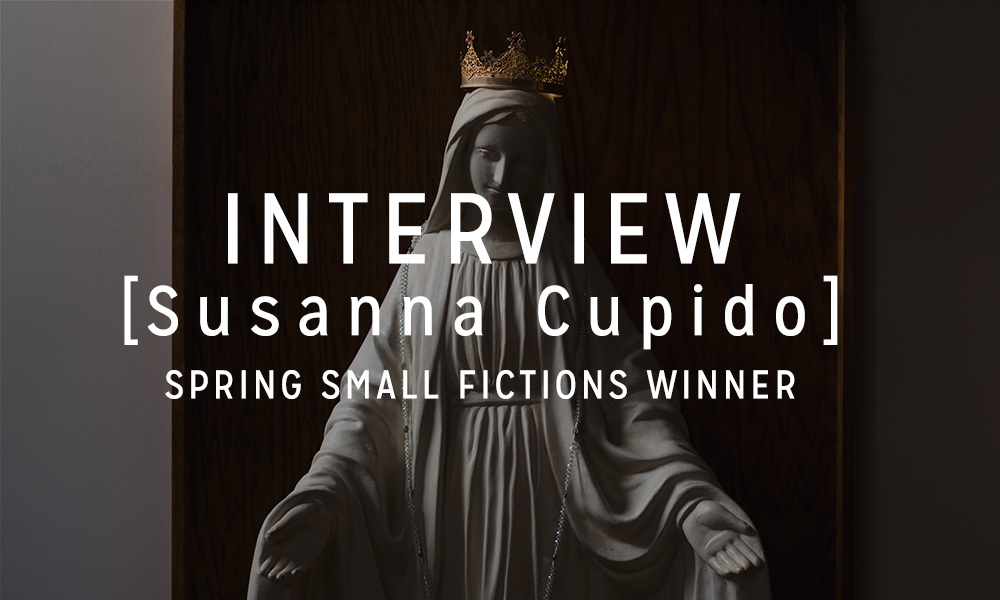Earlier this week, we featured the winner of the Sudden Fiction category in our Spring Small Fiction Awards, Susanna Cupido’s “Immaculate,” a story which K-Ming Chang described as “an unforgettable full-body experience.” Check out Cupido’s winning work, and then read our interview with the author below!

I love how this story begins with the (creepy) picture of the Virgin Mary. Is that where the story always started?
Not quite! Originally, I’d started with just the conversation between the two girls, with them talking their way through an imaginary sexual encounter. Then I started thinking about why they might be doing this verbally instead of physically, and what constraints or pressures they might be under. From there, I knew I wanted to explore a religious angle and remembered staying briefly in an apartment where my bedroom had a single portrait on the wall; I remembered how horribly uncomfortable I’d felt, falling asleep every night with it “watching” me. With that memory in mind, I rewrote the beginning of the story to center around the picture of the Virgin Mary.
So much of this story centers on purity—what is and is not pure—which is a big theme in Catholicism. It feels to me like this story had the potential to be either too subtle or too overt with its imagery and undertones, and I’m wondering if you can speak to the process of writing it. Were there places you had to pull back a bit? Or places you went back and added more direct, un-subtle images?
I think that’s always such a difficult line to walk for me; I really enjoy playing around with imagery, trying to explore abstract ideas (for instance, purity!) through concrete objects, but it’s always so easy to overdo it. Here, the biggest change I made was probably going back to add the little episode at the end, with the juice spilling and staining the tablecloth. The in-progress story still felt a bit thin at that point, beginning and ending in the bedroom, and I was really attracted to the (direct and less-subtle) image of the stain on the white cloth, challenging that notion of purity. Usually, I try to err on the side of being more subtle instead of less, since the reader can always fill in those gaps, but I wanted to push this one a bit farther. I really wanted to show the narrator’s ambivalence and uncertainty about what happened.
As someone who went to Catholic school, one of my favorite parts of the story is when the protagonist questions the immaculate conception. I always got in trouble for asking questions that couldn’t be answered and so the moment resonated with me as a kind of dig against blind acceptance. What did that moment in the story mean for you? How does it inform the rest of the story?
I’m so glad that moment struck a chord! It was informed by a lot of my memories of being a young teenager—I spent so much time pondering those “mysteries” and trying to puzzle them out! I really wanted to portray that kind of literal-minded thinking and to depict it as a consequence of being alone in one’s own head. The protagonist has been exploring these concepts on her own, questioning everything, because she’s been taught that vocalizing her doubts is wrong. I’ve tried to make that a theme throughout the story. If somebody took the time to properly explain the immaculate conception story to her, she’d probably have understood it; if she’d ever been educated about sex, she’d feel more secure in herself.
Is the short-short form the form in which you always write? If not, how was this piece different from what you usually write?
Generally, I like to experiment with lengths, going from short-short stories to longer ones to novels. But short-short stories are definitely what I’ve felt most comfortable with! I really enjoy how contained and concise they have to be; it’s always such a fun challenge to prune away the superfluous details. In general, it’s always neat to have a pre-existing structure to build a narrative around or a particular rule to follow, since I think a hard limit on length can really push me to think creatively. Having infinite space to tell a story still feels a bit scary to me—the longer I go for, the more I second-guess things!
Interviewed by Jen Dupree
